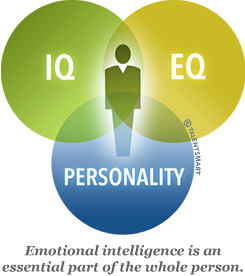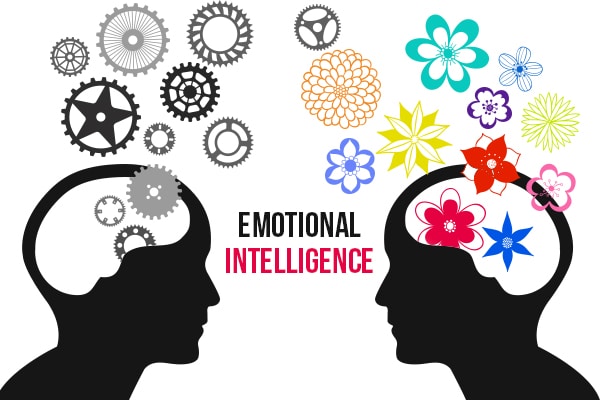This is a question that came in from Quora, but lately this is also a conversation I’ve had with a few people recently – and so I thought I’d post it here as well.
There are three basic steps to improving your emotional intelligence:
- Listen to what someone has to say
- Think about what they’re saying without reacting to what they’re saying
- Let them know that you heard them without passing judgment
It’s that easy. The problem, of course, is that people don’t do any of those three.
 Listening
Listening
It’s not just about hearing what someone says, it’s about active listening. Internalizing not just the words coming out of someone’s mouth, but also the significance behind them, is critical. What is this person saying versus not saying? Is there something that may be motivating them in such a way that what they’re complaining/talking about is not actually the real problem?
Thinking
When someone says something that you disagree with (and lately it seems that everyone disagrees vehemently about everything), the first instinct is often to push back. It is impossible to achieve any semblance of “emotional intelligence” if you are:
- convinced you already know what the other person is saying before they have a chance to say it, and
- you repeatedly demonstrate that you have not properly understood what the other person is saying in the first place!
If you haven’t seen this video, it’s well worth the watch. It’s the now infamous interview between Jordan Peterson, a clinical psychologist, and Cathy Newman, a Channel 4 (UK) journalist. It is a masterclass in metacommunicative communication, as well as how not to achieve emotional intelligence:
[youtube=”https://www.youtube.com/watch?v=aMcjxSThD54″]
It doesn’t take long to see example after example here. What becomes painfully obvious in less than a minute is that Ms. Newman is not even listening, let alone internalizing what Dr. Peterson has been saying. Some examples:
On the subject of women’s satisfaction in their choice of male partners:
Peterson: Well what sort of partner do [women] want? You want an overgrown child? Or do you want someone to contend with, that’s going to help you?
Newman: So you’re saying women have some sort of duty to sort of help fix the crisis of masculinity?
This is not a quote taken out of context. In fact, there is no context: at no point before this had there been a discussion of “toxic masculinity.” Ms. Newman simply didn’t listen or think about what Dr. Peterson had said.
One more example that’s worth noting, specifically because it’s a highly emotional topic and easily one that gets people not listening, on the idea of a “gendered wage gap:”
Peterson: Well, men and women won’t sort themselves into the same categories if you leave them alone to do it off their own accord. We’ve already seen that in Scandinavia. It’s twenty to one female nurses to male, something like that. It might not be quite that extreme. And approximately the same male engineers to female engineers. And that’s a consequence of the free choice of men and women in the societies that have gone farther than any other societies to make gender equality the purpose of the law!
Those are ineradicable differences! You can eradicate them with tremendous social pressure and tyranny! But if you leave men and women to make their own choices you will not get equal outcome!
Newman: Right, so you’re saying that anyone who believes in equality, whether you call them feminists, call them whatever you want to call them, should basically give up, because it ain’t gonna happen!
Peterson: Only if they’re aiming at equality of outcome.
Newman: So you’re saying give people equality of opportunity, that’s fine?
Peterson: Not only fine, it’s eminently desirable for everyone, for individuals and for society.
Newman: But still women aren’t gonna make it! That’s what you’re really saying.
Notice how Ms. Newman’s last statement (in this excerpt) indicates that the entire exchange that precedes it didn’t exist? Someone with emotional intelligence (now, remember, this is an attack interview, so she has no desire to exhibit emotional connection with Dr. Peterson) would not behave in this way.
Reflecting/Mirroring
I bring up the Peterson/Newman interview for another reason – she uses a technique called reflecting (also called mirroring) to redefine what Peterson says. This is incredibly important, because it can be done to improve relationships, and it can be used to destroy them.
Newman uses it to destroy the relationship. An emotionally intelligent person uses it to improve a relationship.

Cell phone picture of Ms. Newman during the interview with Jordan Peterson
Here’s what I’m talking about.
The act of mirroring back what someone says is a tool, and like any tool you can use it right or wrong. If your goal is to learn and exhibit emotional intelligence, then doing it the way Ms. Newman did is using it wrong. (Ms. Newman’s goal was to attack and demonize Dr. Peterson, not understand him, so she was using it for the opposite purpose).
In order to use this kind of tool in the right way, you have to at least try to be accurate that you are describing what the other person said. You need to give it your best shot, remove your own bias, and let them know that you were actually paying attention to what they were saying.
This is not enough, but it’s an excellent start. Most of the time, people feel like they have something to say, and they just need to say it. Sure, you may think you already know what it is they’re going to say, and you may actually be right. But still, they have a need to be able to express themselves.
When you reflect back their ideas – whether you agree with them or not – you have let them know that that mission was accomplished. They were able to express themselves and be heard.
Even if you were to stop at this point (theoretically), the nature of the relationship will have improved. But then, and this is where emotional intelligence comes in, if you can internalize what the other person is saying and understand where they are coming from – again, even if you don’t agree with it – then you make everything better.
Slow It Down!
Whether you call this emotional intelligence, EQ (Emotional Quotient), or active listening skills, the end result is the same thing. You need to be able to slow the conversation down so that you get the ability to learn something that you didn’t already know.
Think about this for a second – what is this person trying to tell you? Is it a simple fact, or is it about how they feel about something? Is it about an event, a person, or an idea? Is it about an interaction, communication with someone or something else?
Did you already know about these facts, events, communications? Maybe, maybe not. But what is 100% certain is that you did not know what this other person wishes to convey about those facts, events, and communications right now. They may have said the same thing over and over again – which should tell you something in and of itself. It should tell you that, despite repeating themselves, they believe they have not yet been heard.
Having a high EQ would mean that you would recognize this, and let them know that whatever this topic of conversation is, is important to them. That is having high emotional intelligence.
In any case, if all you do is run around thinking about how you can express yourself, how you have something to say, how you need to correct people because they’re wrong, then you will fail at achieving any semblance of this. It really is that simple.
The key, then, is to slow down long enough to separate out the facts, from the communication of those facts, to the emotional foundation of the communication of those facts. When you can slow down enough to be able to see each of these clearly in your own mind, then you are well on your way to achieving emotional intelligence.


Comments
Interesting that you gave the Cathy Newman / Jordan Peterson as an example. Jordan Peterson does not believe in EQ as a valid conceptual entity.
A fair point, to be sure. My examples of Peterson/Newman were really about the metacommunicative aspects, rather than espousing Jordan’s take on the subject, but your point is well-taken. 🙂
Believe it or not, I agree with the stance that EQ may not actually be a quantitatively measurable (or even well-defined) conceptual entity. Most of the time I’ve heard it referenced has to do with some correlation to “empathy,” rather than a measurable construct on its own. Nevertheless, I thought the questioner’s POV was less about the clinical applicability of EQ as a construct and more about the aspect of actively trying to be aware of others’ emotional states. Oh well. 🙂
The same thought ran through my mind.